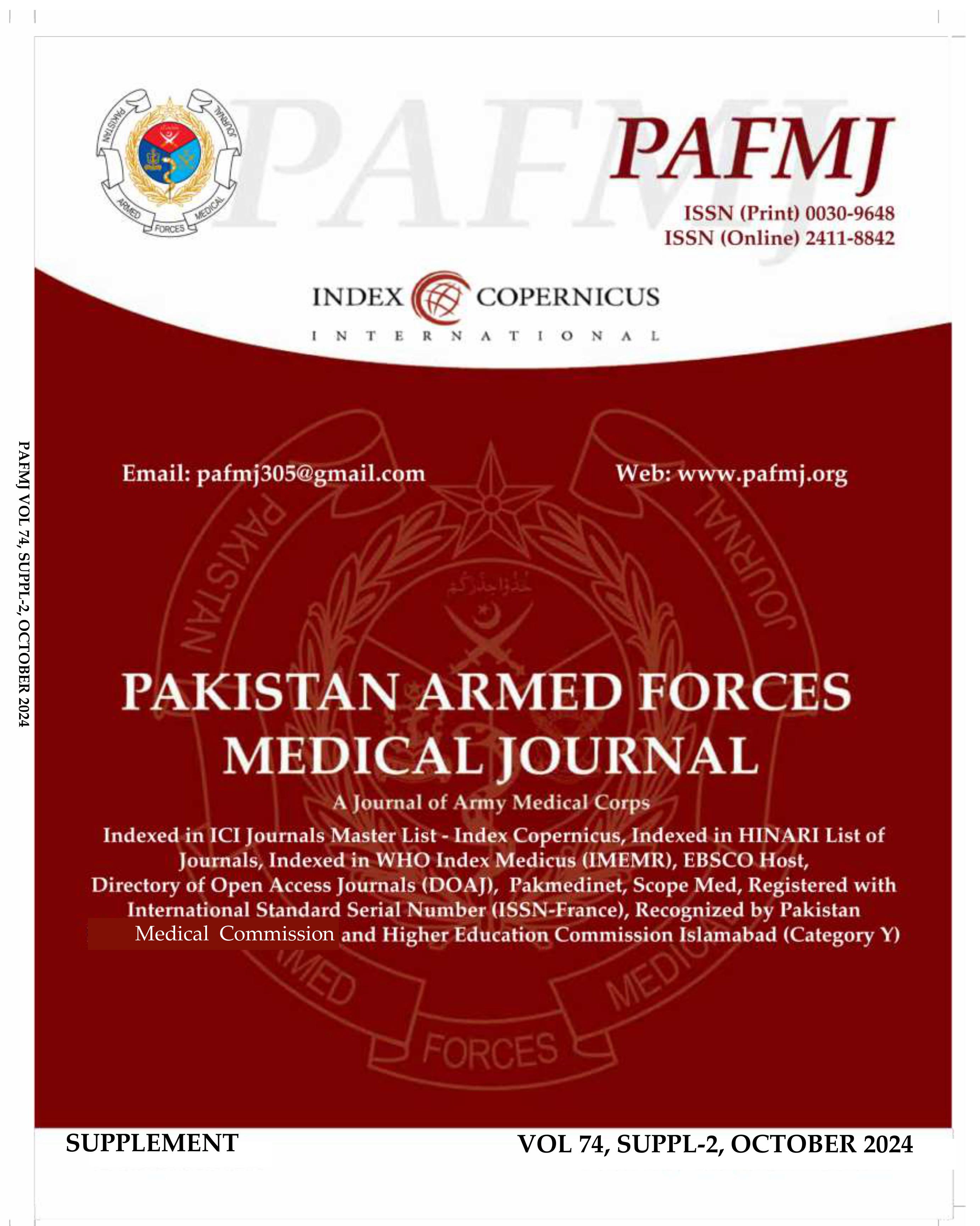Outtcome of Fllexiiblle Naiilliing iin Forearm Fracttures iin Chiilldren
DOI:
https://doi.org/10.51253/pafmj.v74iSUPPL-2.10436Keywords:
Children; Flexible nailing; Forearm fracture; Outcome.Abstract
Objective: To look for outcome and analyze the factors influencing outcome of flexible nailing in forearm fractures in children
managed at tertiary care orthopedics unit.
Study Design: Case Series.
Place and Duration of Study: Orthopedic Department, Combined Military Hospital, Rawalpindi Pakistan, from Jul 2022 to
Mar2023.
Methodology: A prospective case series was conducted on the pediatric patients managed for forearm fractures with flexible
nailing in our orthopedics unit. Outcome was assessed at 10 weeks after the surgical procedure. Poor outcome was defined if
there was non-union on x-ray, pain on range of motion or skin erosion at site of nailing. Factors like age, gender, poly trauma
and anemia at time of presentation were associated with poor outcome in children recruited in this case series.
Results A total of 30 children with forearm fractures treated with flexible nails were included in the final analysis. Out of them
23(76.6%) were male while 07(23.4%) were females. Mean age of the children recruited in study was 5.83±2.16 years. 20(66.7%)
children with forearm fracture treated with flexible nails had good outcome after surgery while 10(33.3%) had poor outcome.
Chi-square analysis revealed that poly trauma and presence of anemia at the time of presentation were the factors statistically
significant associated with poor outcome (p-value<0.001) in our study participants.
Conclusion: Skin erosion at skin site was a common finding seen in pediatric patients managed for forearm fractures with
flexible nailing. Patients with poly-trauma and anemia at the time of presentation were more at risk of having poor outcome
after flexible nailing.
Downloads
References
Salman S, Saleem SG, Shaikh Q, Yaffee AQ. Epidemiology and outcomes
of trauma patients at The Indus Hospital, Karachi, Pakistan, 2017 -
Pak J Med Sci 2020; 36(1): S9-S13.
https://doi.org/10.12669/pjms.36.ICON-Suppl.1717
Hegde S, Bawa M, Kanojia RP, Mahajan JK, Menon P, Samujh R, et al.
Pediatric Trauma: Management and Lessons Learned. J Indian Assoc
Pediatr Surg 2020; 25(3): 142-146.
https://doi.org/10.4103/jiaps.JIAPS_35_19.
Korup LR, Larsen P, Nanthan KR, Arildsen M, Warming N, Sørensen S, et
al. Children's distal forearm fractures: a population-based epidemiology
study of 4,316 fractures. Bone Jt Open 2022; 3(6): 448-454.
https://doi.org/10.1302/2633-1462.36.BJO-2022-0040.R1
Kyriakides J, Peeters W, Ahluwalia AK, Elvey M. Paediatric forearm
fractures: assessment and initial management. Br J Hosp Med (Lond)
; 83(9): 1-9.
https://doi.org/10.12968/hmed.2021.0564
Caruso G, Caldari E, Sturla FD, Caldaria A, Re DL, Pagetti P, et al.
Management of pediatric forearm fractures: what is the best therapeutic
choice? A narrative review of the literature. Musculoskelet Surg 2021;
(3): 225-234.
https://doi.org/10.1007/s12306-020-00684-6
Wollkopf ADP, Halbeisen FS, Holland-Cunz SG, Mayr J. Diametaphyseal
Distal Forearm Fractures in Children: A STROBE Compliant Comparison
of Outcomes of Different Stabilization Techniques Regarding
Complications. Children (Basel) 2023; 10(2): 374.
https://doi.org/10.3390/children10020374
Hansen RT, Borghegn NW, Gundtoft PH, Nielsen KA, Balslev-Clausen A,
Viberg B, et al. Change in treatment preferences in pediatric diaphyseal
forearm fractures: a Danish nationwide register study of 36,244 fractures
between 1997 and 2016. Acta Orthop 2023; 94(1): 32-37.
https://doi.org/10.2340/17453674.2023.7132
Leuba A, Ceroni D, Tabard-Fougère A, Lutz N. Clinical and financial
impacts of flexible intramedullary nailing in pediatric diaphyseal forearm
fractures: A case-control study. J Child Orthop 2022; 16(3): 220-226.
https://doi.org/10.1177/18632521221106380
Poutoglidou F, Metaxiotis D, Kazas C, Alvanos D, Mpeletsiotis A. Flexible
intramedullary nailing in the treatment of forearm fractures in children
and adolescents, a systematic review. J Orthop 2020; 20(3): 125-130.
https://doi.org/10.1016/j.jor.2020.01.002
Mansoor K, Shahnawaz S, Ahmad A, Arif MM, Hamza M. Epidemiology
of childhood fractures in the city of Karachi. J Ayub Med Coll Abbottabad
; 27(3): 608-612.
Flynn H, Solarz MK, Rehman S. Forearm Fractures: Diagnosis and
Contemporary Treatment Strategies. Instr Course Lect 2022; 71(3): 303-
Upasani VV, Li Y. Elastic Intramedullary Nailing of Pediatric Both-Bone
Forearm Fractures. JBJS Essent Surg Tech 2020; 10(4): e19.00055.
https://doi.org/10.2106/JBJS.ST.19.00055
Riccio AI, Blumberg TJ, Baldwin KD, Schoenecker JG. Intramedullary
Ulnar Fixation for the Treatment of Monteggia Fracture. JBJS Essent Surg
Tech 2021; 11(2): e19.00076.
https://doi.org/10.2106/JBJS.ST.19.00076
Moscheo C, Licciardello M, Samperi P, La Spina M, Di Cataldo A, Russo
G. New Insights into Iron Deficiency Anemia in Children: A Practical
Review. Metabolites 2022; 12(4): 289.
https://doi.org/10.3390/metabo12040289
Agbley DY, Holdbrook-Smith HA, Segbefia M, Ahonon Y, Marfo K.
Factors affecting early re-displacement of paediatric diaphyseal forearm
fractures at Korle Bu Teaching Hospital. Ghana Med J 2020; 54(3): 151-155.
https://doi.org/10.4314/gmj.v54i3.5
Patel A, Li L, Anand A. Systematic review: functional outcomes and
complications of intramedullary nailing versus plate fixation for bothbone
diaphyseal forearm fractures in children. Injury 2014; 45(8): 1135-
https://doi.org/10.1016/j.injury.2014.04.020
Asadollahi S, Pourali M, Heidari K. Predictive factors for re-displacement
in diaphyseal forearm fractures in children-role of radiographic indices.
Acta Orthop 2017; 88(1): 101-108.
https://doi.org/10.1080/17453674.2016.1255784
Antabak A, Luetic T, Ivo S. Treatment outcomes of both-bone diaphyseal
paediatric forearm fractures. Injury 2013; 44 Suppl 3: S11-S15.
Downloads
Published
Issue
Section
License
Copyright (c) 2024 Hafiz Faiz ur Rehman, Mian Qaisar Ali Shah, Ahmed Rafi, Bilal Ahmed Qureshi, Muhammad Labib

This work is licensed under a Creative Commons Attribution-NonCommercial 4.0 International License.















